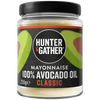Collagen can help give you luscious hair and nails, wrinkle-free skin and improved joint health. But what happens when your natural collagen production slows down?
Collagen is the most abundant protein in the human body. You naturally produce collagen on your own — which comes with a host of health benefits attached. Unfortunately, collagen synthesis declines as you age. In fact, research shows that the amount of collagen in your body declines 1% per year after age 30 [1]. This can lead to brittle hair and nails, sore joints and wrinkly, aged skin.
But don't give way to frown lines just yet, because we have a piece of good news: You can take collagen supplements to replace your natural collagen lost due to ageing. Collagen peptides are essentially collagen in powder form, which can be easily added to any hot or cold liquid.
How do collagen peptides work, exactly? Are all collagen supplements created equal? Below, we share everything you need to know about collagen peptides, including what they are, how they benefit your health and how to search for a high-quality product.
What Are Collagen Peptides?

To understand collagen peptides, you first need to know what collagen is.
As stated earlier, collagen is the most abundant protein in your body. In fact, collagen represents 30% of your body's total protein mass [2]. There are 16 different types of collagen available, with type III, type II and type I collagen being the most common (nearly 80% of your body's collagen comes from type II alone) [3].
Collagen is found in virtually every connective tissue in your body, including your bones, ligaments, cartilage and muscles. Therefore, it comes as no surprise that collagen plays an integral role in the function of the human body. Collagen helps give your body structure — it helps build healthy, rigid bones and teeth, produces lubricating, well-functioning joints and helps maintain skin elasticity. Low amounts of collagen can easily lead to inflamed ligaments and tendons, brutal joint pain and premature ageing.
Around age 30, your collagen production will naturally slow down. While scientists aren't quite sure why this happens, they believe certain lifestyle factors — such as poor diet choices, free radicals, stress, excessive caffeine intake and pollution — can accelerate the process [4][5][6].
Collagen production slowing down due to ageing is inevitable. Fortunately, you can gain some of that collagen back in supplement form. That's where collagen peptides come in.
Collagen peptides are made from the skin, bones, scales or connective tissues of animals. These dietary supplements are typically a white, flavourless powder that can be easily added to hot or cold beverages. You can also consume collagen by drinking bone broth, where you simmer animal bones in water and apple cider vinegar for a long period of time to extract the beneficial collagen. (Note: This collagen may not be as easily utilised by the body, whereas collagen peptides are broken down and readily available.)
Lastly, you can consume gelatin, which is derived from collagen when bone broth is cooled, it will have a solid, jelly-like consistency — this is gelatin. However, you cannot heat collagen to make gelatin.
What Are the Health Benefits of Collagen Peptides?
The most obvious benefit of taking collagen peptides is to make up for lost collagen production — but what does this mean for your body?
Taking collagen peptides daily offers the following significant health benefits without the side effects commonly associated with dairy-based protein powders such as whey and casein (especially for those with dairy allergies or intolerances).
1. It Promotes Healthy, Beautiful Skin
Science shows that taking collagen peptides can reduce wrinkles, improve the hydration of your skin and improve skin elasticity.
In fact, one study showed that taking collagen supplements for just four weeks showed significant improvements in skin hydration, elasticity, roughness and density in women ages 35 and older [7]. Another study showed that taking collagen peptides daily for eight weeks could significantly decrease wrinkles and dark spots under the eyes [8].
2. It Keeps Your Bones Healthy and Strong
As you age, your body begins to reabsorb calcium and phosphate, causing a loss in mineral density in your bones [9]. This causes weak, fragile bones, which leads to an increased risk of injury.
Fortunately, taking collagen peptides can help. Research shows that collagen supplementation has an anabolic (growth) effect on bone formation and bone mineral density. Over the course of one year, post-menopausal women took collagen daily, which caused an increase in type I and type II collagen levels and increased bone density [10].
3. It Can Lead to Increased Muscle Mass
Collagen is filled with amino acids, the building blocks of protein. You need high-quality protein in order to undergo muscle protein synthesis (repairing and rebuilding your muscles post-workout).
Studies show that taking collagen peptides causes an increase in muscle mass. In a 12-week study, daily collagen supplementation combined with resistance training caused a significant increase in fat-free muscle mass compared to the placebo group. In addition, while the placebo group saw an increase in fat mass, those taking collagen did not [11].
What to Look for in a Collagen Peptide Supplement

Not all collagen peptides powders are created equal. When searching for a collagen supplement, keep these factors in mind:
- Always choose hydrolysed collagen: Hydrolyzed (hydrolysed) collagen, or collagen hydrolysate, are made by breaking collagen molecules down in a process called hydrolysis. This makes the collagen easier to digest, working with the natural process of your existing enzymes (and avoids harsh chemicals).
- Select the highest-quality sourcing you can find: The quality of the collagen is directly related to the quality of the animal it comes from. Choose from bovine collagen sourced from grass-fed cows or marine collagen sourced from wild-caught fish.
- Opt for powdered collagen: Collagen comes in sachets, tablets and protein powders. Always select an unflavoured powder from 100% collagen, as tablets and sachets often come with sweeteners, flavours, bulking agents (like maltodextrin or rice powder) or other added ingredients.
- Choose a high-quality, nutritional product: Collagen should be naturally gluten-free, paleo-friendly, keto-friendly, dairy-free and sweetener-free. If a product does not comply with any of the above, it probably has unwanted fillers or additives.
Daily Collagen Peptides Can Help Slow Down the Ageing Process
Collagen is the most abundant and beneficial protein in the human body. High collagen production leads to healthy joints, hair, skin, nails, bones and muscles, but unfortunately, you will naturally produce less collagen as you age.
Collagen peptides are made by extracting collagen from the connective tissues of animals, such as fish, lamb, pigs and cattle. This powdered, flavourless supplement can help slow down the ageing process, leading to increased bone density, decreased wrinkles and increased muscle mass. For this reason, collagen peptides are becoming one of the most popular wellness supplements available — but not all are created equal.
When purchasing a collagen peptide product in stores or online on Amazon, you should always choose the highest-quality product you can afford. Choose bovine collagen sourced from grass-fed cows and marine collagen sourced from wild-caught fish. In addition, always choose a flavourless, powdered product that contains a single product: 100% collagen.
All information provided on our website and within our articles is simply information, opinion, anecdotal thoughts and experiences to provide you with the tools to thrive.
It is not intended to treat or diagnose symptoms and is definitely not intended to be misconstrued for medical advice. We always advise you seek the advice of a trained professional when implementing any changes to your lifestyle and dietary habits.
We do however recommend seeking the services of a trained professional who questions the conventional wisdom to enable you to become the best version of yourself.
RESOURCES
[1] https://www.ncbi.nlm.nih.gov/pmc/articles/PMC3583892
[2] https://www.ncbi.nlm.nih.gov/pmc/articles/PMC7271718/
[3] https://www.ncbi.nlm.nih.gov/pmc/articles/PMC6056177/
[4] https://www.ncbi.nlm.nih.gov/pmc/articles/PMC4082169/
[5] https://www.ncbi.nlm.nih.gov/pmc/articles/PMC4206198/
[6] https://www.ncbi.nlm.nih.gov/pmc/articles/PMC3583881/
[7] https://www.ncbi.nlm.nih.gov/pmc/articles/PMC6835901/
[8] https://pubmed.ncbi.nlm.nih.gov/24401291/
[9] https://medlineplus.gov/ency/patientinstructions/000506.htm
[10] https://pubmed.ncbi.nlm.nih.gov/29337906/
[11] https://www.ncbi.nlm.nih.gov/pmc/articles/PMC6566878/
















